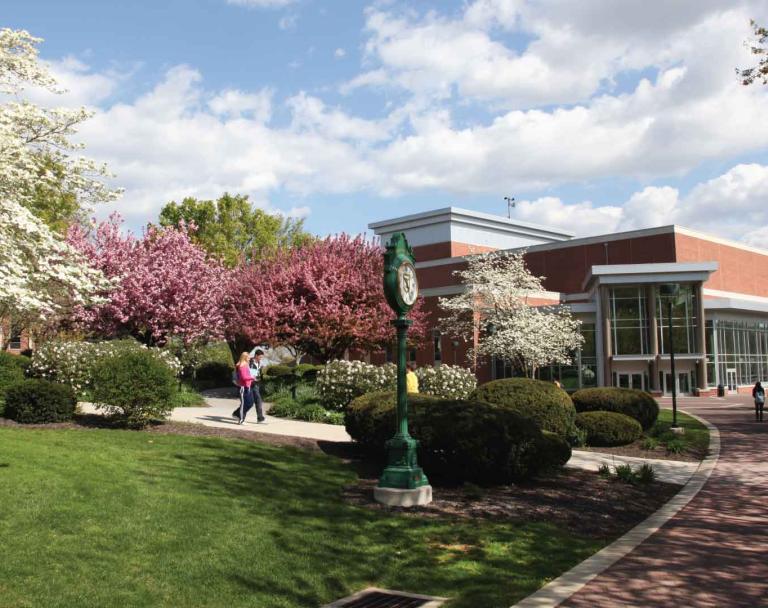Rich Wurzbach

Entrepreneurs’ collaboration with York College students builds solutions, efficiencies
When Rich Wurzbach needs to tap brain power for his grease-analysis business, he has a few sources at his fingertips.
The president of MRG Labs can naturally turn to his staff or perhaps poke his fellow entrepreneurs at the offices around the corner. Often, though, he finds himself drawing from the diverse pool of talented York College of Pennsylvania students, who’ve played a major role at MRG and other companies at the J.D. Brown Center for Entrepreneurship over the years.
Wurzbach calls MRG Labs an “anchor technology company” that’s involved in production and laboratory research and development. With three patents awarded and three pending, it helps incubate other companies from its space at the J.D. Brown Center.
Turning to students
Not long ago, when a manufacturer halted production of a common instrument that MRG used to determine the condition of a lubricant based on its color, MRG had to develop its own device. It wanted to use a smartphone’s lighting, camera and processing ability to evaluate a grease’s color. It offered a $1,000 prize at York College’s 2017 technology hackathon – YCP Hacks – to anyone who could develop the methodology.
A Computer Science major, a student of instructor Don Hake, took up the challenge and recruited fellow students for the task.
The team went beyond MRG’s original idea of using a cellphone. It pointed the lab toward Bluetooth technology and the use of a sensor. With that idea, the students claimed the $1,000 award.
“We believe it was a very good investment in terms of the value it gave our organization and the ideas it gave us in a very short time,” Wurzbach says of its YCP Hacks challenge.
Using the students’ proposal, MRG Labs is working with a company to adapt that product to the dimensions of the Grease Thief. MRG is also working with York College graduate Kyle Musco's company, Moena, to design the data interface between that product and the data app that Kyle wrote for the Grease Analysis lab.
A factory for ideas
The college’s business incubator houses two established companies, including MRG, and at least four startups. At one firm, York College students who have developed its website are about to become equity partners.
Several of the companies were launched by students.
“We have student-founded companies and companies founded because of students at the J.D. Brown Center,” Hake says. “Two new companies there wouldn’t exist or have the opportunity to move forward without student involvement.”
One student-founded company, Moena, is developing custom software for MRG’s grease analysis.
Collaborating with other businesses at the incubator also has proved economical, Wurzbach says.
“There’s a lot of efficiency when you’re able to build teamwork within the center,” he notes.
MRG has employed students as interns almost continually since its arrival in 2011.
“It’s nice because we get to test-drive them as interns, and we have had some very good and successful hirings,” Wurzbach says. Working with Mechanical Engineering students a few summers ago, MRG designed an instrument that it sells around the world.
Hake says the students are enjoying “incredible real-world experience,” academic credit, mentorship, and the possibility of full-time employment after graduation.
“It’s a wonderful collaboration,” he says.
The fun side of science
Hake is looking forward to the 2018 hackathon. No doubt many York College students are, as well. About half of the 150 participants in 2017 were from the college.
The free event, hatched from a freshman’s idea in 2016, is run and led by students. Hake says its name refers not to breaking into something online but to hacking an idea into reality.
“Like-minded people come together to see what they can make,” he explains.
Individuals and teams can arrive with a tech idea and build on it, or they can be assigned a challenge. In addition to activities and contests, the weekend-long event includes seminars on subjects such as robotics and drones, talks by industry experts, and even a Nerf battle to help participants unwind.
Industry representatives also attend with an eye out for prospective employees.
“That is the kind of people you want,” Hake says of the student participants. “They might have the highest level of creativity and interest and desire, all in one place.”
YCP Hacks takes place in the fall, though dates haven’t been set. Interested college students at least 18 years old can request information by emailing info@ycphacks.io. Details also will be posted online at Ycphacks.io.

